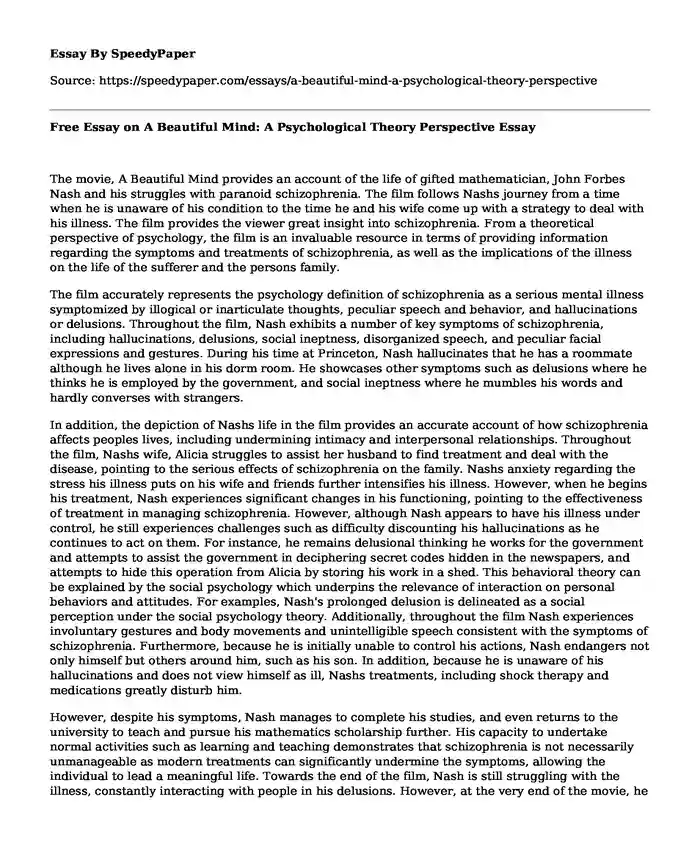
| Type of paper: | Essay |
| Categories: | Psychology Movie |
| Pages: | 3 |
| Wordcount: | 622 words |
The movie, A Beautiful Mind provides an account of the life of gifted mathematician, John Forbes Nash and his struggles with paranoid schizophrenia. The film follows Nashs journey from a time when he is unaware of his condition to the time he and his wife come up with a strategy to deal with his illness. The film provides the viewer great insight into schizophrenia. From a theoretical perspective of psychology, the film is an invaluable resource in terms of providing information regarding the symptoms and treatments of schizophrenia, as well as the implications of the illness on the life of the sufferer and the persons family.
The film accurately represents the psychology definition of schizophrenia as a serious mental illness symptomized by illogical or inarticulate thoughts, peculiar speech and behavior, and hallucinations or delusions. Throughout the film, Nash exhibits a number of key symptoms of schizophrenia, including hallucinations, delusions, social ineptness, disorganized speech, and peculiar facial expressions and gestures. During his time at Princeton, Nash hallucinates that he has a roommate although he lives alone in his dorm room. He showcases other symptoms such as delusions where he thinks he is employed by the government, and social ineptness where he mumbles his words and hardly converses with strangers.
In addition, the depiction of Nashs life in the film provides an accurate account of how schizophrenia affects peoples lives, including undermining intimacy and interpersonal relationships. Throughout the film, Nashs wife, Alicia struggles to assist her husband to find treatment and deal with the disease, pointing to the serious effects of schizophrenia on the family. Nashs anxiety regarding the stress his illness puts on his wife and friends further intensifies his illness. However, when he begins his treatment, Nash experiences significant changes in his functioning, pointing to the effectiveness of treatment in managing schizophrenia. However, although Nash appears to have his illness under control, he still experiences challenges such as difficulty discounting his hallucinations as he continues to act on them. For instance, he remains delusional thinking he works for the government and attempts to assist the government in deciphering secret codes hidden in the newspapers, and attempts to hide this operation from Alicia by storing his work in a shed. This behavioral theory can be explained by the social psychology which underpins the relevance of interaction on personal behaviors and attitudes. For examples, Nash's prolonged delusion is delineated as a social perception under the social psychology theory. Additionally, throughout the film Nash experiences involuntary gestures and body movements and unintelligible speech consistent with the symptoms of schizophrenia. Furthermore, because he is initially unable to control his actions, Nash endangers not only himself but others around him, such as his son. In addition, because he is unaware of his hallucinations and does not view himself as ill, Nashs treatments, including shock therapy and medications greatly disturb him.
However, despite his symptoms, Nash manages to complete his studies, and even returns to the university to teach and pursue his mathematics scholarship further. His capacity to undertake normal activities such as learning and teaching demonstrates that schizophrenia is not necessarily unmanageable as modern treatments can significantly undermine the symptoms, allowing the individual to lead a meaningful life. Towards the end of the film, Nash is still struggling with the illness, constantly interacting with people in his delusions. However, at the very end of the movie, he appears to have control over his illness, for instance, as he chooses to disregard his hallucinations and delusions; depicting a psychosocial development in his behavioral trait. As a consequence, he gains the admiration and respect of his colleagues, demonstrating that with patience and compassion from others, persons suffering from schizophrenia can successfully deal with the illness and lead fruitful lives.
Cite this page
Free Essay on A Beautiful Mind: A Psychological Theory Perspective. (2019, Aug 28). Retrieved from https://speedypaper.com/essays/a-beautiful-mind-a-psychological-theory-perspective
Request Removal
If you are the original author of this essay and no longer wish to have it published on the SpeedyPaper website, please click below to request its removal:
- Grass-Fed Beef versus Grain-Fed Beef - Free Essay on Food Safety
- Hyperthyroidism Research - Free Essay Example
- Essay Sample Highlighting David Zinc Zecko's Research
- Database and Network Security, Computer Science Essay Example
- Literary Essay Sample: The Line Becomes a River by Francisco Cantu
- Churchill's Communication Style Analysis - Paper Example
- Hammurabi's Laws: History, Impact and Relevance to Marriage Relationships - Essay Sample
Popular categories




